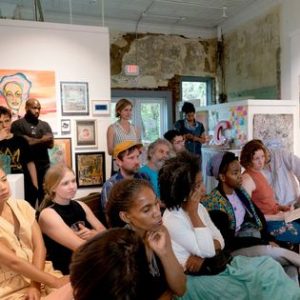 The Social Practice Lab (SPL) brings together scholars, artists, and activists through signature projects and public interventions. Directed by Pedro Lasch (Associate Research Professor of Art, Art History & Visual Studies), the SPL is funded by the Provost and housed at the FHI.
The Social Practice Lab (SPL) brings together scholars, artists, and activists through signature projects and public interventions. Directed by Pedro Lasch (Associate Research Professor of Art, Art History & Visual Studies), the SPL is funded by the Provost and housed at the FHI.
In the last two decades, socially engaged art has entered the life of museums, universities, corporations, and even governments. Described as participatory art, relational aesthetics, and social practice, to name a few, the variety of terms and definitions for the phenomenon is as rich as its prolific and at times contradictory manifestations.
While the mainstream embrace of these practices is cause for celebration, it is rarely accompanied by a deeper understanding of their history, or an appreciation for the complexity of their methods. Universities are best equipped to provide a remedy by strengthening the impact and scope of social art with the rigorous structures so characteristic of the sciences and humanities at research institutions. Socially engaged art, on the other hand, may provide more traditional academic disciplines in those very institutions with fresh and unexpected approaches to interdisciplinary work and collaboration, a higher degree of public engagement, as well as deeper student involvement through a full range of knowledge production that intentionally balances intellectual, cognitive, and affective dimensions.
Ultimately, the promotion of social art practice and its integration to the university is only the first step towards the more relevant goal of reevaluating the notion of ‘arts and sciences’ and also creating a more socially engaged humanities. Regardless of any existing connection to art, social practice may in fact be restored to its rightful place as a core mechanism of intellectual life, extending far outside the art gallery, the university classroom, or the research lab. By its very name, the Social Practice Lab thus resists and complements traditions that see individualist introspection as the main access to scientific and artistic discovery. We will attempt to know the world through each other and each other through the world, even as others still prefer to know themselves.

SPL’s operations are centered on the creation of multi-year signature projects and public interventions, as well as smaller, student-led productions happening on a single year or single semester basis. SPL projects bring together guest collaborators, faculty, and students through research and production teams, curricular tracks, and ongoing opportunities that extend beyond the social and geographic boundaries of the university (age, income, neighborhood, region, country). For the same reason, most of our projects strategically and playfully link internal university units with regional, national, and international organizations. SPL programming of guest visits, talks, and discussions tend to be directed toward specific projects, focused on the workshop and production model. The lab thus complements the abundant discursive and theoretical offerings that already exist on campus with material processes that highlight the importance of practice, doing, and making.
SPL projects are chosen and developed for their ability to ask challenging questions, create interdisciplinary collaborations with a concrete outcome or aesthetic experience, and foster exchanges across units and academic levels that may begin, develop, or end outside the classroom. As deskilling sets root in post-industrial modes of arts instruction and publishing stands questioned as the only legitimate output in the humanities, SPL wishes to promote a radical reskilling for scholars, artists, makers, and public intellectuals that find their home in the university. Rather than think of the humanities as being in crisis, SPL sees this time as a critical period for their reinvention, a process that may be inseparable from the activist impulse behind creating a more intelligent, creative, and just society.